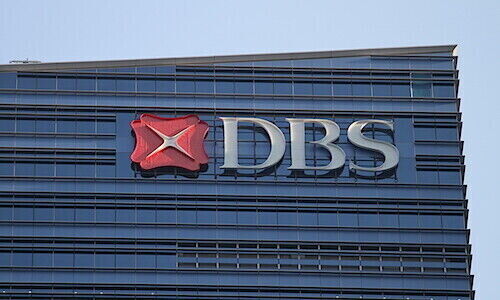DBS Tips China Property and Tech
DBS Bank’s wealth management is giving clients some counterintuitive advice, going positive on China tech stocks and certain mainland property bonds.
Between a nearly two-year selloff in China equities and continued fears over the mainland’s property market amid developer China Evergrande Group’s struggles to service its more than $300 billion of liabilities, it’s a bold call.
Hou Wey Fook, chief investment officer for consumer banking and wealth management at DBS Bank, at the chief investment office (CIO), told media that the China crackdown on tech has sent the sector’s shares to a steep price-to-earnings discount to U.S. technology shares, from a valuation premium.
Upgrading China
«We are convinced the time to upgrade China equities has arrived,» he told media Tuesday. The DBS CIO upgraded China to Overweight on valuation and policy support, noting China equities are trading at a 37 percent discount to global equities on a forward price-to-earnings basis, compared with a long-term average of a 23 percent discount.
Yeang Cheng Ling, DBS CIO senior investment strategist, pointed to China’s government moving to be supportive of the market on the regulatory front for the tech sector.
Regulatory Support
«The suppression in the earnings outlook should be nearing the end or should be bottoming,» he said at the briefing. He also noted that the China tech sector gets most of its revenue domestically, making it a beneficiary of growing domestic consumption.
To be sure, DBS CIO made the call on China tech stocks before a «Wall Street Journal» report broke Wednesday that the mainland’s online video industry could face fresh curbs. That sent Hong Kong-listed tech stocks tumbling Wednesday.
But other recent policy signals have been more positive.
Policy Signals
Earlier this week, China state media indicated Chinese and U.S. regulators were «moving toward each other» on concerns over U.S.-listed Chinese companies, particularly over restrictions on foreign access to Chinese audit information, although some signals emerged to temper optimism over the talks.
China equities had rebounded this month as Beijing pledged to support markets, according a media report by official state news agency «Xinhua» citing a committee meeting of the State Council – China's top administrative body. The statement said that Beijing would vow to maintain market stability, support overseas listings and noted that efforts to «rectify» internet platform companies would end soon – a significant signal that the domestic tech crackdown could be in its final chapters.
The People’s Bank of China as well as the China Banking and Insurance Regulatory Commission also followed suit to pledge support for market stability.
Sharp Downturn
But that follows sharp losses since 2020, when the mainland began implementing regulations, sometimes overdue, on new technology areas which had been allowed to engage in a «Wild East» strategy. Indeed, the public reason Alibaba’s financial arm Ant Group saw its Hong Kong and Shanghai IPO plans squashed at the eleventh hour in 2020 was due to concerns over regulating the company as a financial firm, rather than a technology one – the suspension came just after China drafted new rules for microlending online.
Some of the pressure on Chinese companies came from the Trump administration’s haphazard trade war against China, which included efforts to force the mainland’s companies to delist from U.S. markets. China’s response may have amounted to taking its own ball home from the game, leaving U.S. investment banks without IPO deals from the mainland.
Positive on China Bonds
The DBS CIO also said it was positive on China bonds – both government bonds and certain property sector bonds.
Daryl Ho, an investment strategist at DBS’ CIO, said an «obvious» credit trade within Asia is Chinese government bonds, because the central bank is easing policy. That’s out of step with much of the West, which is tightening policy to contain inflation. Bond yields move inversely to prices, so lower yields imply price increases.
Ho added, central banks globally are also seeking to diversify their foreign exchange reserves away from relying on U.S. Treasurys, marking another tailwind for China government bonds.
When it came to plays on high-yield credit in Asia, Ho pointed to China property, despite recent fears about a crash in the sector. Ho said that China property bonds have two classes: Those trading without pricing in anything detrimental, and those trading at around 30 percent to 40 percent of face value, near their recovery value.
China Property
For the China property bonds trading closer to face value, Ho said it may be a good idea to take money off the table as upside would likely be only 5-10 percent to par value, while the downside could be significant in a full-blown crisis.
But Ho was more positive on bonds trading at a fraction of their face value. «If the government decides to do a broad sweeping strategy of saving the bond market, something like what they did with reverse announcement for equities, then you have significant upside for these bonds trading in the 30-40 range, but the downside is also quite capped,» Ho said.
In the CIO Insights report for the first quarter of this year, DBS CIO said the property construction slowdown in China should be «sufficiently priced in and stabilized» as the mainland is expected to increase infrastructure investment, which would stabilize the housing market.



























